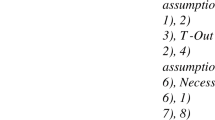Abstract
The appropriateness of S5 as a logic of knowledge has been attacked at some length in the philosophical literature. Here one particular attack based on the interplay between knowledge and belief is considered: Suppose that knowledge satisfies S5, belief satisfies KD45, and both the entailment property (knowledge implies belief) and positive certainty (if the agent believes something, she believes she knows it) hold. Then it can be shown that belief reduces to knowledge: it is impossible to have false beliefs. While the entialment property has typically been viewed as perhaps the least controversial of these assumptions, an argument is presented that it can plausibly be viewed as the culprit. More precisely, it is shown that this attack fails if we weaken the entailment property so that it applies only to objective (nonmodal) formulas, rather than to arbitrary formulas. Since the standard arguments in favor of the entailment property are typically given only for objective formulas, this observation suggests that care must be taken in applying intuitions that seem reasonable in the case of objective formulas to arbitrary formulas.
Similar content being viewed by others
References
Fagin, R., Halpern, J.Y., Moses, Y., and Vardi, M.Y. (1995). Reasoning about Knowledge. Cambridge, Mass., MIT Press.
Friedman, N. and Halpern, J.Y. (1994). A knowledge-based framework for belief change. Part I: Foundations, in R. Fagin (ed.), Theoretical Aspects of Reasoning about Knowledge: Proc. Fifth Conference, pp. 44–64. San Francisco, Calif., Morgan Kaufmann.
Halpern, J.Y. (1987). Using reasoning about knowledge to analyze distributed systems, in J. F. Traub, B. J. Grosz, B. W. Lampson, and N. J. Nilsson (eds), Annual Review of Computer Science, Vol. 2, pp. 37–68. Palo Alto, Calif, Annual Reviews Inc.
Halpern, J.Y. (1991). The relationship between knowledge, belief, and certinty, Annals of Mathematics and Artificial Intelligence 4, 301–322.
Halpern, J.Y. (1993). Reasoning about knowledge: a survey circa 1991, in A. Kent and J. G. Williams (eds), Encyclopedia of Computer Science and Technology, Vol. 27 (Supp. 12), pp. 275–296. New York, Marcel Dekker.
Hoek, W.van der (1993). Systems for knowledge and belief, Journal of Logic and Computation 3(2), 173–195.
Kraus, S. and Lehmann, D.J. (1988). Knowledge, belief, and time, Theoretical Computer Science 58, 155–174.
Ladner, R.E. (1977). The computational complexity of provability in systems of modal propositional logic, SIAM Journal on Computing 6(3), 467–480.
Lamarre, P. and Shoham, Y. (1994). Knowledge, certainty, belief, and conditionalisation, in J. Doyle, E. Sandewall, and P. Torasso (eds), Principles of Knowledge Representation and Reasoning: Proc. Fourth International Conference (KR ′94), pp. 415–424. San Francisco, Calif., Morgan Kaufmann.
Lenzen, W. (1978). Recent work in epistemic logic, Acta Philosophica Fennica 30, 1–219.
Lenzen, W. (1979). Epistemische betrachtungen zu [S4, S5]. Erkenntnis 14, 33–56.
Moses, Y. and Shoham, Y. (1993). Belief as defeasible knowledge, Artificial Intelligence 64(2), 299–322.
Voorbraak, F. (1991). The theory of objective knowledge and rational belief, in Logics in AI, European Workshop JELIA ′90, Berlin-New York, pp. 499–515. Springer-Verlag.
Voorbraak, F. (1992). Generalized Kripke models for epistemic logic, in Y. O. Moses (ed.), Theoretical Aspects of Reasoning about Knowledge: Proc. Fourth Conference, pp. 214–228. San Francisco, Calif., Morgan Kaufmann.
Author information
Authors and Affiliations
Additional information
Research sponsored in part by the Air Force office of Scientific Research (AFSC), under Contract F49620-91-C-0080. The United States Government is authorized to reproduce and distribute reprints for governmental purposes.
Rights and permissions
About this article
Cite this article
Halpern, J.Y. Should knowledge entail belief?. J Philos Logic 25, 483–494 (1996). https://doi.org/10.1007/BF00257382
Issue Date:
DOI: https://doi.org/10.1007/BF00257382




